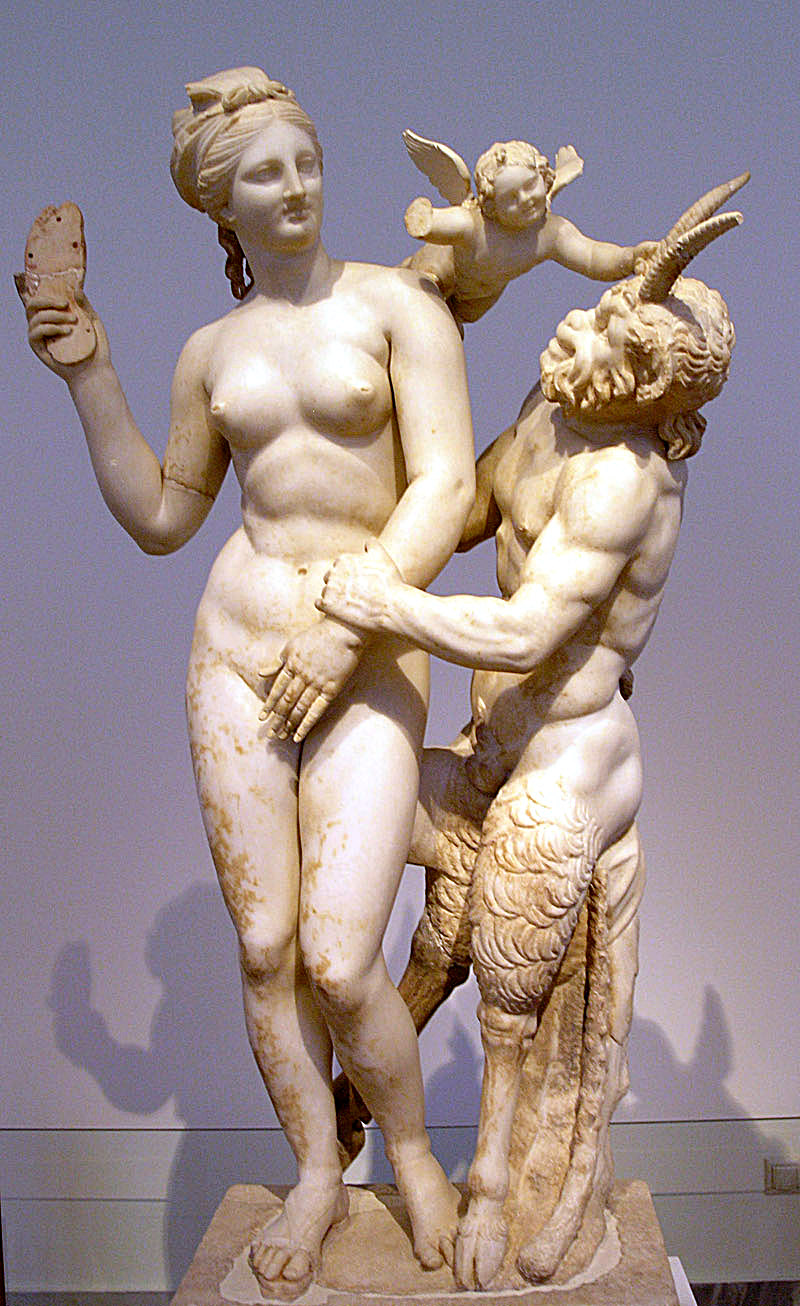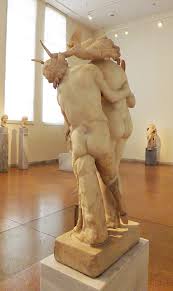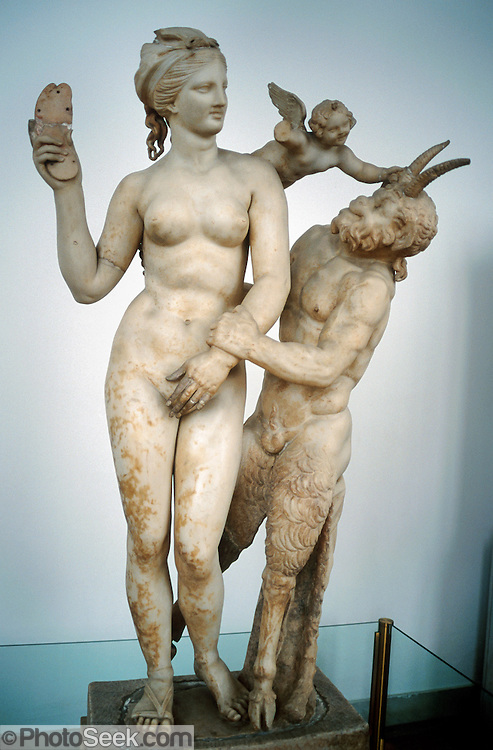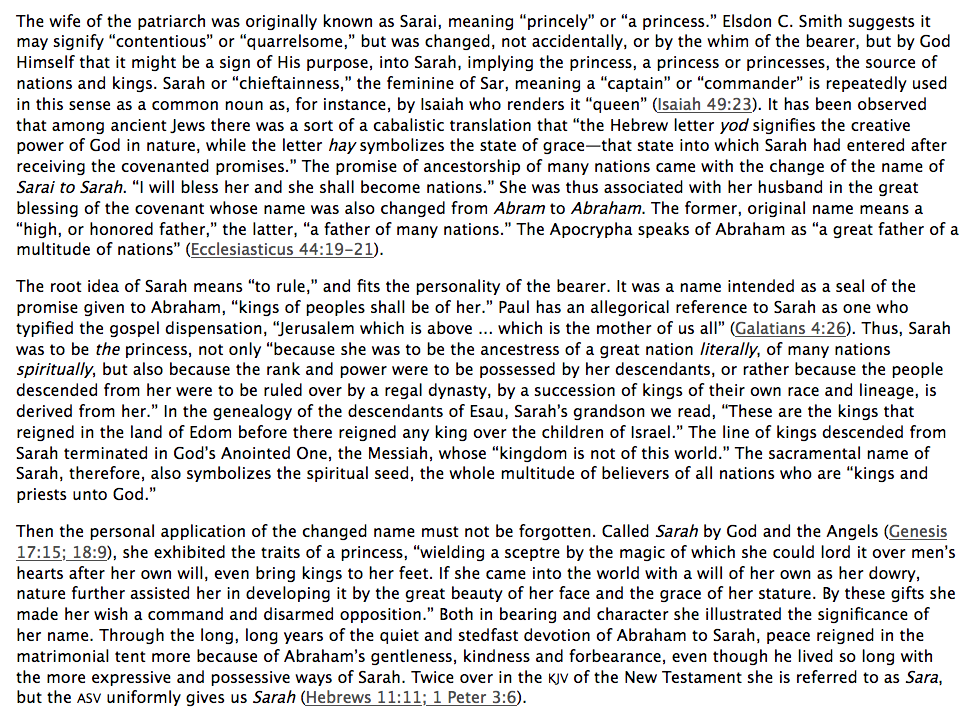Aphrodite & Pan

As readers might know, many of my stories involve evolved, crossed and parallel time streams.
In my book, The Goddess Aped, fauns and satyrs are from the woodwose family. They are often portrayed as half-man and half-beast to represent being of Adun/Adam but retaining their “wild” nature. They did not necessarily look like that. As part of the story, a faun named Ez travelled to Aphrodite to tell her that Ares has been killed. She is stricken with immense grief and sends the faun away. Looking for him everywhere, she cannot find Ares and so she sends for the faun. When he arrives, Aphrodite is barely able to speak. The devastation and pain are almost unbearable even for the faun. She does not look at him but demands proof. The faun says he heard the body of Ares was destroyed but he will look. Not more than a day passes before he returns with bones as evidence and says they are from his spine.
Numbly, she runs the bones through her fingers. Her tears are spent. Looking down at the bones strewn on the ground, she tells the faun of her decision to seek revenge. He points to the sky to remind her that Zeus made the decision to let Aries die. Would she not seek the blood of Zeus? Aphrodite explains that is not possible. Would Zeus not destroy her? Aphrodite seems to not hear. She hisses to him, “bring me their names.” The faun says he knows of some involved already. When she asks who planned the death of her husband, the faun says it was the son of Eve-known as Cain. In Hebrew, Cain means acquired. For whatever the reason, Eve could not have her own children. So she and Adun/Adam adopted a woodwose and named him Cain. Adoption was not prevalent or common so his name was to mean that he was purposely chosen to join their immediate family.
Aphrodite set-out to find Cain. What most mortals did not know is that Aphrodite was once known as Bela/Bael/Ba’al (“Ba a’ El”). The ancient word, “bel,” meant lord or god and the distinction of “a,” meant female. For those with any familiarity of the Bible, you will know the story told of Cain and Abel. Unknown to Aphrodite, what the faun spoke was all a lie. The faun runs to warn Cain. Eve’s child awaits the arrival of Aphrodite with his small army of fellow farmers and shepherds. He scoffs at her accusations and says her husband has run off with a mortal-that the great Aphrodite cannot satisfy Ares and she is there simply of jealousy and spite.Then he suggests that perhaps he is off with his own mother-Eve.-for is she not the one who stole Adun/Adam from her?
Furious, she takes the list the faun has given her and goes on a rampage for revenge. With the blood of the first kill, she dyes her hair red. At each stop, she rolls out the bones onto a piece of skin and their configuration determines the fate of the men and if they will live or die. It is one of the men who sees the bones and pleads with Aphrodite to listen to him. He assures her that those are not spinal bones but are, in fact, the bones of an animal. He slaughters the goat he was saving for sabbath and shows her.
Reeling from what she has done, and disgusted by how easily she was manipulated, Aphrodite hurries home to find her husband-Ares (Samael) waiting for her. She is consumed with emotion but has almost no time to explain the situation before Eve and Cain arrive. Eve lambasts Aphrodite for her accusations against Cain and says that she has brought so much shame upon Adun/Adam that he cannot bear the sight of Cain or to call him his son. For this, Eve demands that Ares (Samael) be known as the father of Cain. It was also well known that Aphrodite would mock Eve and the woodwose for being cannibals. So it was no surprise when Eve demanded that Aphrodite be known as “Ishbela”- “killer/devourer of men” and her son, Cain, and his line would be forever known as the “killer of gods.”
Horrified to hear of what his wife had done, but having no context, Ares agrees and pleads for their forgiveness.
Only later does Adun/Adam tell Ares the full story. By then, the story has grown that Cain killed Bela and is the destroyer of Gods. Aphrodite is seen a a fraud and her temples and figures as Bela are destroyed. Once Ares is aware of what happened, he demands retribution. So for this, Bela’s name in the story is changed to “Abel” and Ares says that the story of Cain will be written on tablets in all lands for every man, woman and child to see. Cain is then branded as a “murderer” for his paltry skirmish and moment of embarrassment. As time went on this changed and became a parable for the desired offerings to god rather than a matter of being spoken against by Aphrodite and accepting a title Cain did not deserve. Ares said it was Bela (Abel) who was “killed” and paid the ultimate price of losing her identity, respect and adoration. Cain accepts his punishment but the faun does not. He says that he was manipulated by Eve to go against Aphrodite and provides evidence. For his obstinance and bravery, the faun is named “Yael (God’s Strength)” and he is declared forever in the service of Aphrodite and to protect her in the absence of Ares.
The faun agreed, but in time would come to call himself Ezelyael, which would become Ezelyiel and that Ezekiel. His name is also said to mean, “God’s strength.” One could see this as being god’s “muscle,” in so far as him protecting Aphrodite, Ares and their children. In Jewish tradition, there is a prophet noted with the name Ezekiel. While it is written that he had a wife, there are no offspring mentioned. Ezekiel did not write his own book of prophecies. While not mentioned in the Q’uran, Ezekiel is also considered a prophet of Islam.
Given his mark and reputation, Eve renamed Cain “Yisrael,” thus taking from Azrael and the faun’s Ezyael. Unrepentant, the name still meant “contender or fighter of God.” It is unknown whether Cain continued on to also become known as Jacob or if that was his son. Assuming it was his son, from here, Israel’s son Jacob would begin the line of Jewish people and Eve would help develop the Judaic faith.
And when Ares proudly proclaimed Israel was named after him, Eve laughed and readily pointed out that it was named after her goats.
Aphrodite would come to be known as Asherah (“she who walks on the sea”), Ares would be known in stories as “El” and Eve was known as “Sara.” Adun/Adam may have been known as Ephram or Abram during this time and Eve began to refer to him as a brother. The names and contexts during this period and beyond will begin to become even more confusing as Eve ramps up her rivalry and mimicry of Aphrodite and begins a campaign to paint Aphrodite and Ares as the villains behind the crimes and actions that she not only committed but then claimed to be victim of.




